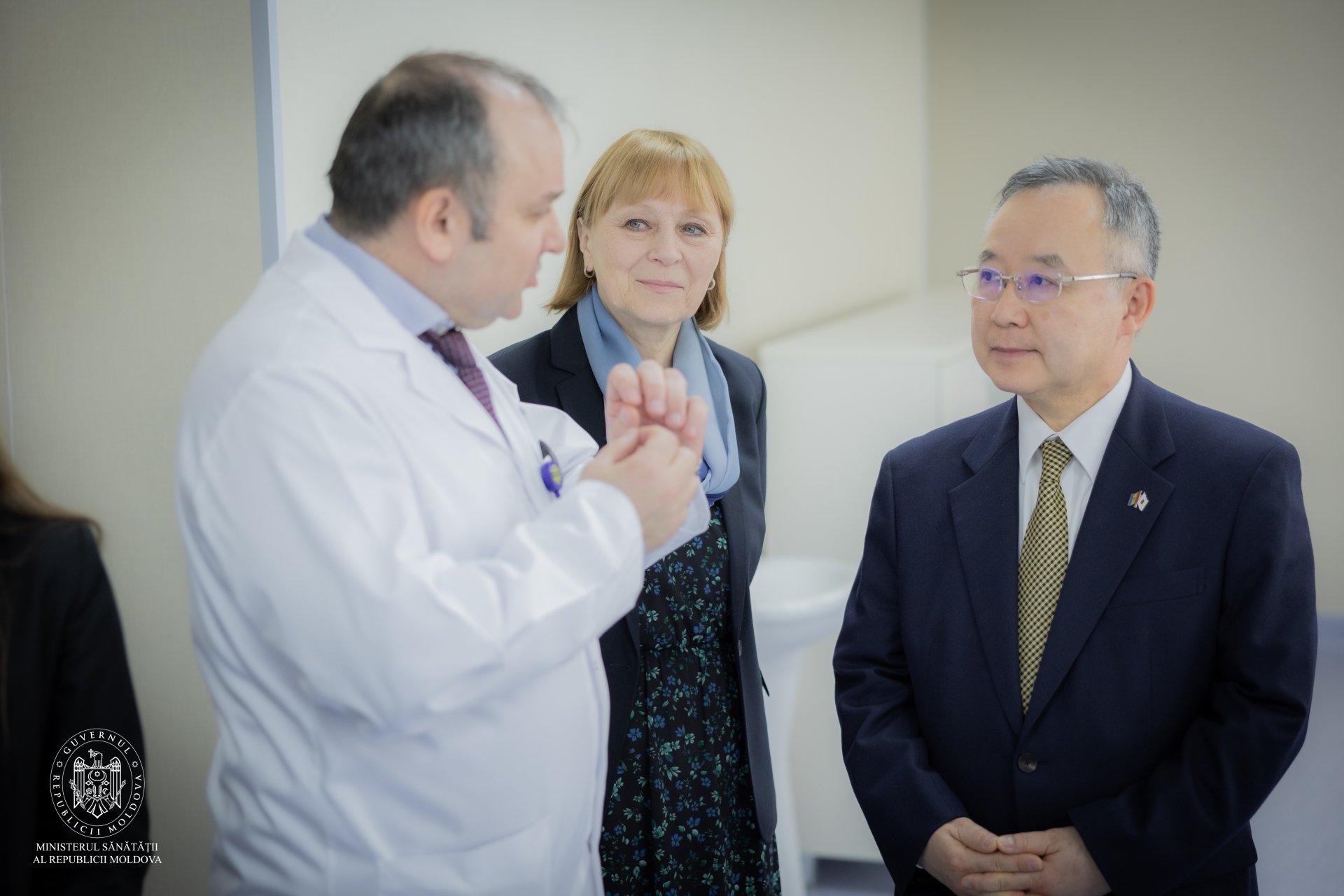
First hybrid diagnosis and treatment service launched at Chisinau-based Oncology Institute
The first hybrid diagnosis and treatment service in the oncology sector today was launched at the public medical and sanitary institution, Oncology Institute. It includes the diagnosis and treatment of cancer diseases with advanced equipment, provided to the institution as part of a project financially supported by the government of Japan. "One of the priorities of the Ministry of Health is to provide doctors with diagnosis and treatment solutions, to make them strong in the face of this cruel disease," Health Minister Ala Nemerenco said at the service launch event.
The new cancer diagnosis and treatment service is a first for the medicine sector of Moldova. It will allow for early cancer detection and the implementation of individualized treatment solutions for each patient, according to the form and progression of the disease.
According to Ruslan Baltaga, director of the Oncology Institute, the institution today received a state-of-the-art computer tomography system with 256 slices, digital tomographic device with tomosynthesis, a modern ultrasound machine with elastography capabilities, cutting-edge technology and equipment for pulmonary and digestive ecoendoscopy, operating table, and anesthesia equipment.
The new service, according to the institution's manager, enables accurate diagnostics with individualized treatment.
"With the launch of the hybrid diagnostic and treatment service, the range of diagnostic, minimally invasive procedures via natural access routes without incisions are expanded, especially in cancer localizations with difficult access, like lung, pancreas, biliary tract, kidneys, and prostate cancers. For this purpose, the combined use of technology will be applied. The central aspect of these services is that procedures are performed under anesthesia, in order to ensure the specialist's comfort and the safety of the patient undergoing this procedure," Ruslan Baltaga noted.
Modernizing the institution, equipping it with advanced equipment, as well as creating conditions for cancer treatment is one of the Health Ministry's primary objectives. "Cancer is treatable," Minister Ana Nemerenco said.
"Oncology is a field involving a lot of suffering. In Moldova, oncological diseases were diagnosed late, and the survival rate of this category of patients was low. Today, cancer is treatable. In many cases, cancer is treated like any other disease. It is essential to detect it in time and have modern treatment solutions. One of the Health Ministry's priorities, right from the beginning of my mandate, was this institution, and I wholeheartedly wished to provide doctors with diagnosis and treatment solutions to make them strong in the face of such a cruel disease," stated Nemerenco.
The largest financial contribution to the purchasing of equipment came from the government of Japan through the Cooperation Agency. The health minister expressed gratitude to the Japanese ambassador present at the event, noting that the institution had implemented several projects supported by the Tokyo authorities.
"Early detection and treatment can save many lives. The Oncology Institute plays an essential role in Moldova. Over the past two and a half years since I came to this country, I have visited many medical institutions and noticed that conditions have improved. This is largely due to the leadership of the minister, who has succeeded in convincing Japan and other development partners that the government of Moldova is determined to improve people's lives through efficient management, better working conditions and adopting new technology. Significant reform of the Moldovan medical system has taken place under challenging conditions - the COVID pandemic, refugee crisis, rising energy prices due to Russia's pressure to deter Moldova from European integration. Moldova did not give up. I would like to express my deep respect for the medical professionals and the people of Moldova for their resilience and their outstanding example of humanity. These pieces of equipment are symbols of our solidarity and gratitude," said Ambassador of Japan to Moldova Yamada Yoichiro.
The medical equipment cost 40.8 million lei and was purchased as part of a project supported by the government of Japan regarding the strengthening of the institution's capacity to provide medical assistance to Ukrainian refugees. Besides this investment, another 6.2 million lei was used for repair works. The launch of the hybrid diagnostic and treatment service in oncology was financially supported by the Health Ministry with 2.8 million lei and the National Health Insurance Company, which contributed 3.4 million lei.
In 2024, as part of the program funded by the government of Japan, the Oncology Institute received medical equipment worth 33 million lei.
Medical premiere: 78-year-old woman's life saved by Whipple surgery in Moldova
PHOTO Two new forests take root on banks of Dniester: green hope for Moldova's future
Moldovan civil society's warning: amendments made to industrial emissions law endanger public health, environment
Moldova to receive 30 million euros for renovating 15 model schools
Over 1,500 people affected by Chernobyl nuclear accident to get increased allowances
EBRD to allocate additional grant of 600,000 euros for solid waste project in Moldova
Experience exchange in radioactive waste management
Detentions take place in customs bribery case in Moldova
Moldovan citizens can schedule online for services provided by National Social Insurances House based on international social security agreements
Moldovan president congratulates graduates of Moldovan State University's Law Faculty
President on working visit to Rîșcani district
Moldova aligns its foreign policy with international sanctions: Foreign Affairs Ministry to have decision-making authority
Moldovan state increases monthly allowances for participants Chernobyl accident relief works
Moldovan parliament approves new measures for enhancing road safety in Moldova
Romanian language teachers of Moldova to attend training courses in Romania
Moldova joins three international conventions to facilitate trade, modernize customs procedures
Moldova takes another step towards European Common Transit System
Parliament adopts national strategy for capital market development for next five years
Moldova promotes religious tourism through RESPECTS project
Speaker on European Council's decision
Moldova strengthens cooperation with Poland
Moldovan president welcomes European Council's decision
Nine medals for Moldovan athletes at European Championships in Slovenia
PHOTO // ANSA veterinarians trained in sample collection
The Siberia Files – memory tour of Chisinau-based Mihai Eminescu National Theatre to Romania


